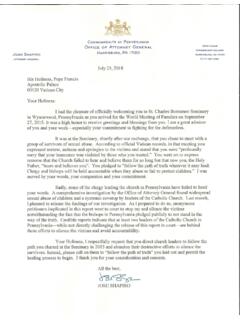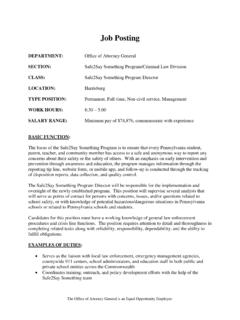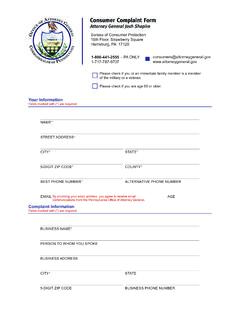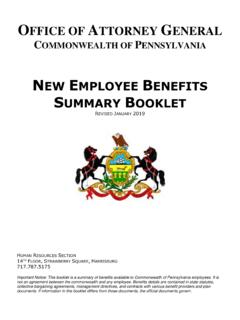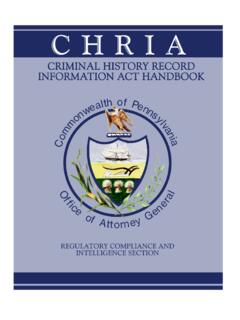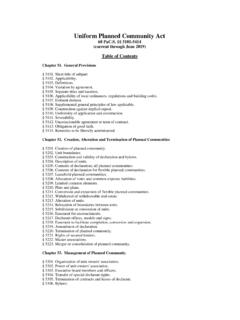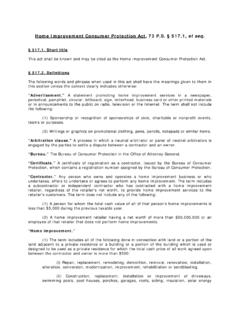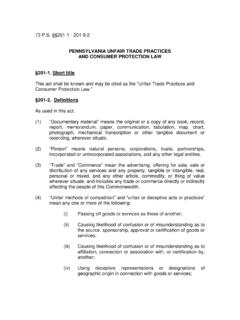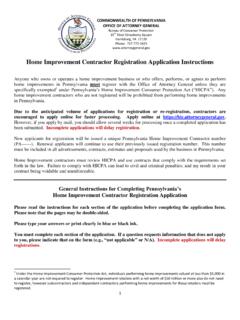Transcription of Nonprofit Board Members and Senior - attorneygeneral.gov
1 Nonprofit Board Members and Senior Management: The Office of Attorney general recognizes the vital service that you provide to your community through your work as a Board member or Senior manager of a charitable Nonprofit organization. Your willingness to volunteer your time and expertise is deeply appreciated. The purpose of this guide is to provide you with some basic information about matters which affect charitable Nonprofit organizations because those entities fall within the Attorney general 's jurisdiction. The Attorney general has a duty to protect the public's interest in the charitable assets held by Nonprofit corporations.
2 In response to the many difficult questions confronting the boards of charitable organizations today, the Attorney general 's office is offering this guide to assist you in your efforts to better serve your organizations. This guide presents general information and is not intended to direct the exact manner in which a Pennsylvania Nonprofit Board must operate. To obtain additional information regarding your fiduciary duties as a manager or Board member or the rules and regulations for the creation, operation and dissolution of Nonprofit charitable organizations please consult the Nonprofit Corporation Law of 1988, as amended, 15 Pa.
3 5101 6146 ( Nonprofit Law). This guide is not a substitute for legal advice. If you have questions, seek qualified legal counsel to ensure that you and your Board 's actions are in compliance with Pennsylvania law. This handbook and many other resources are also available on our website at Thank you for your hard work and dedication to public service. Our Commonwealth is a better place because of your volunteer efforts. INTRODUCTION. This guide is intended to provide Senior management and Board Members with general information relating to the operation of charitable Nonprofit organizations.
4 If you have any questions regarding these organizations, please contact the Office of Attorney general at: Commonwealth of Pennsylvania Office of Attorney general Charitable Trusts and Organizations Section 14th Floor, Strawberry Square Harrisburg, Pennsylvania 17120. Telephone: (717) 783-2853. Facsimile: (717) 787-1190. QUESTIONS YOU SHOULD ASK BEFORE JOINING A. Board . What is the charitable purpose of the organization? Charitable purposes is defined by the Nonprofit Law as [t]he relief of poverty, the advancement and provision of education, including postsecondary education, the advancement of religion, the prevention and treatment of disease or injury, including mental retardation and mental disorders, governmental or municipal purposes and any other purpose the accomplishment of which is recognized as important and beneficial to the public.
5 Obtain as much information as possible about the organization. Review the Articles of Incorporation, bylaws, internal operating manuals, minutes of prior Board meetings and annual reports. What is the financial status of the organization? As a Board member or Senior manager you are responsible for ensuring that the assets committed to a charitable purpose are used for the charitable purpose for which they were intended. Review the Nonprofit organization's financial statements and tax returns. Talk with the executive director, staff and current Board Members if you have any questions about the finances of the organization.
6 What are my responsibilities as a Board member? Meet with the officers and executive staff of the charity to discuss your expected duties and responsibilities as a Board member. Determine how much time you will be asked to commit to these duties. Ask about Board committees, organizational structure, financial responsibility and conflict of interest policies. OFFICERS AND DIRECTORS. Every Nonprofit corporation must have a president, a secretary and a treasurer. Although it is not necessary to use the above titles, every Nonprofit corporation must have an individual who fulfills each of those roles and the same individual may fill multiple roles.
7 In order to avoid the appearance of impropriety, it is best not to give one individual too much control over the corporation. Instead, power should be distributed among different officers or Board Members . A corporation may have as many officers with as many different titles as it deems necessary. The bylaws may set forth the qualifications for the positions and the manner in which officers and directors will be elected. The length of the term that each officer or director will serve should be set forth in the bylaws. In the absence of a bylaw dictating term length, the Nonprofit Law provides that each officer or director will serve a one year term.
8 Committees may be established to handle some aspects of the organization's governance. At any time, an officer or director may resign by giving written notice to the corporation. FIDUCIARY RESPONSIBILITIES OF Board . Members AND Senior MANAGEMENT. 1. DUTY OF CARE. Board Members , Senior management and Members of committees must perform their duties in a manner they reasonably believe to be in the best interests of the corporation using the same degree of care, skill, caution and diligence that a person of ordinary prudence would use under similar circumstances.
9 Decision-makers are required to make reasonable inquiries when analyzing contracts, investments, business dealings, and other matters. An individual who is acting in conformance with this standard will: attend and participate in Board meetings on a regular basis;. attend and participate in committee meetings when the individual is a member of the committee;. diligently read, review, and inquire about material that affects the corporation;. keep abreast of the affairs and finances of the corporation; and use independent judgment when analyzing matters that affect the corporation.
10 Decision-makers may rely on information provided by their employees, committees, attorneys, public accountants and qualified professionals as long as the decision-maker reasonably believes that the information provided is reliable. Decision-makers must use their own independent judgment when evaluating information. Individuals who fail to meet the prescribed standard may be personally liable to the corporation if their actions cause financial harm. Board Members , trustees and Senior management have a fiduciary responsibility when handling finances and investments.
